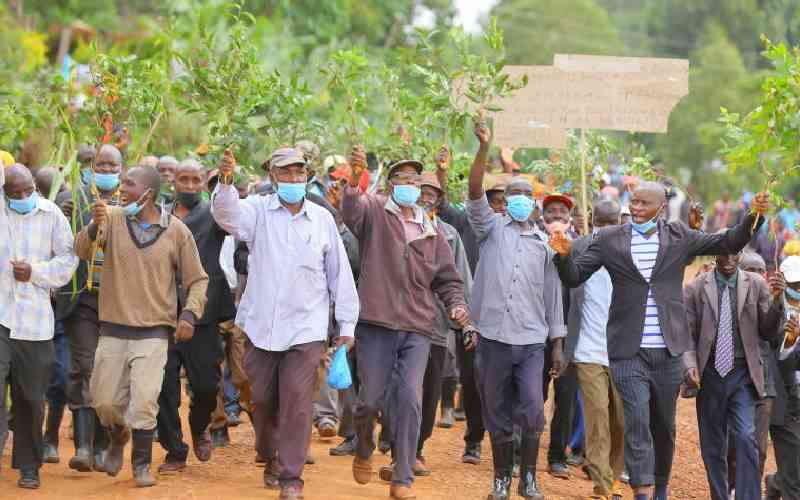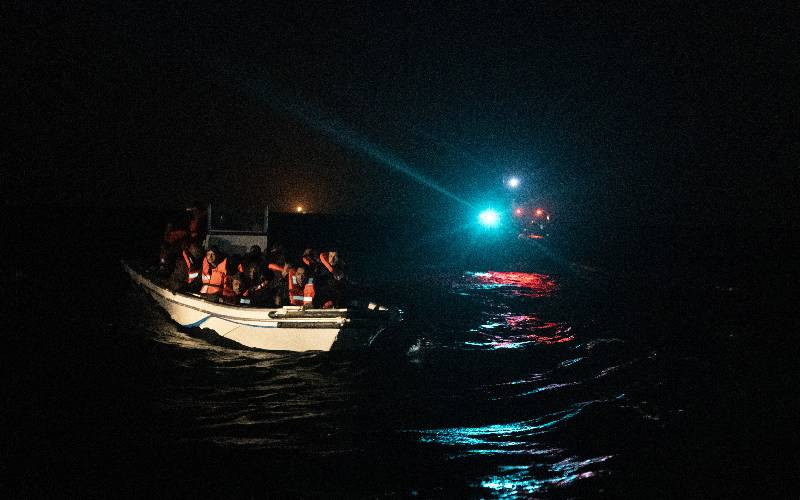When you imagine Cholera, you think of a dingy slum or a crowded neighbourhood with mushrooming eateries lining up on the highways or foot paths.
Yes, it is a disease of poor sanitary conditions as they say. It is that disease of shame, stigmatised by both the rich and poor. They say in literal terms, one must have ingested faecal matter in food or water.
The villages where we find men taking showers upstream while the women and children do their cloth-washing, bathing and collection of water downstream is what you imagine. That makes two of us.
So, when you get the privilege of visiting a so called five-star hotel and more so in the city of Nairobi, the thought of cholera is so distant that you would vehemently rebuke any soul that utters cholera as you take your five-course meal.
This week, I had to humbly agree that diseases are no respecter of status of man or his creations.
Location: Weston Hotel, Langata Road
The well-lit pathways, the organised security checks and the cordial welcome from every staff was reminiscent of the feeling an African would get during the colonial days when he is accepted to have lunch at the so called “whites only” hotels.
The expansive reception welcomes you to this massively impressive architectural design made by man for the upper class.
Scientific Conference
A beautiful well clad lady quickly jumps upfront and asks “Hallo Sir, going for the Scientific Conference?” Oh sure,
I responded. “Please take the staircase on your left and turn right when you reach first floor, the event is happening at Lenana hall” Thank you very much, I quickly respond.
“Have a wonderful day” I overhear her as soon as I take the stairs.
The event is colorful, senior scientists spewing medical terms and research jargons everywhere.
I imbibe all this with curiosity of the cat as I tweet and Whatsapp images and interesting findings to my colleagues back at my workplace. Day one ends on a high note.
The climax being the inspiring speech by the key note speaker. Delving deep into problems of health care in Kenya.
Stay informed. Subscribe to our newsletter
He mentioned how we have lost all the gains the white man left. That as a country we are still battling diseases of public health concern such as Tuberculosis and yes, Cholera.
With the benefit of hindsight now, I was not sure this was a prophecy of doom in the coming days.
Amid cheers and claps from the over 500 members of the audience, the speaker concluded his speech by asking the medical doctors to take back their profession.
Health,politics and professionalism
The call was so as to challenge the status quo, to confront the political class and to agitate for better health care for Kenyans.
The nurse strike was in the seventh day and no word about the failed system from politicians on campaign trail, nor even the doctors seated in the audience. We clapped, we cheered, and ladies ululated as he walked out of the hall in quick successive steps.
The conference chairman, a very funny old physician noted later that he believes that when the key note speaker was born, his guardian angel kissed him on the lips. That is why he is such an orator.
That was all about the first day. Ending on a high note indeed.
Day two and the news-making lunch
Though starting on a low tone picked up as the conference participants ran over each other choosing the different tracks of interest.
One would sit in one of the sessions, overhear cheers and excitement in another room, quickly rush to that one, and realize from the program that another interesting session is happening at fourth floor, immediately moving to partake of the same. The day was packed.
Time was a precious commodity and therefore in the wisdom of the organisers, guys could grab a take-away pack of lunch to consume as they listened to the sessions.
And so, everybody was whisked to the expansive lounge, packs of lunch were staked over each other. You just needed to give away your meal voucher, pick one and a drink then head straight for the halls where science was being discussed in detail by re-known experts from all over the globe.
The day ends well and everyone is happy. Except for the turn of events later in the evening. I had taken all the contents in the lunch pack.
The chicken was especially soft and well cooked. I chewed it to the bone. Later added the fruit and the cake and cleared down the contents in my esophagus with a good drink of bottled water.
I had felt uneasy about the cold chicken but my mind quickly brushed off the idea of food poisoning especially now that I was taking food from such a big hotel.
They must have checked it, cooked by top chefs and a public health officer must have certified it fit for human consumption. How could they risk such a big brand?
Went home after tiresome day,symptoms show up
My humble abode in Nairobi was my next destination. I arrived at around 8 PM, quickly took a shower and settled for my dinner.
I took one massive chunk of ugali, soaked it in the vegetable soup and transferred it to my mouth and down the esophagus to the stomach. Well, it seems its hosts in my gut were not ready to receive it at all.
It was immediately rejected and the thin bitter saliva rode back to the mouth to inform me that I needed to get out quickly and aid the rejection of the ugali.
I obliged and quickly went out, spewed all the ugali and other contents in my stomach. Then all hell broke loose. I needed to rush to the toilet as the turmoil in my gut was worsening.
The bowels had opened all its gates. Initially releasing the undigested chicken taken at the five star hotel, to simply releasing pure water.
I thought my rectum had been turned to a urinary bladder.
Within two hours of battling the unpleasant task of relieving my gut using both openings, I felt dizzy and very weak to even afford another effort of vomiting.
My old medical background came to the fore. It made a diagnosis of dehydration. The kind of which cannot be sorted by taking uji or water like I was trying to counter it. I quickly called a Taxi guy. Oh my, his phone was off.
Distress trying to get medication
My wife rushed to the main road hoping to spot one having the Taxi sign on its roof. There is often a paradox, every time I would be in the vicinity, I see so many of them packed outside our main gate, desperately begging for clients.
Now that I needed one and urgently so, they were nowhere to be seen. Luckily, two motorbike riders were still hanging around trying their luck as the night grew older.
I quickly jumped into one, mention the name Modern Hospital and we were on our way there. The old rusty motorbike engine fought its way there at some point I thought it would stop midway.
Nonetheless we arrived at the hospital, but again, another patient was just being served. He had multiple cuts on his head and was bleeding profusely. I had to wait.
They say angels come in different colours. A nurse quickly spotted me sitting restlessly on my chair and noted the need for quick first aid.
She whisked me away to the observation room, fixed a cannula in my veins which were slowly disappearing and let the first fluids flow profusely.
After two bottles of the magic fluid, my eyes could now open but the vomiting and diarrhoea was still coming in succession.
I was immediately allocated a bed as I gave out samples to be analysed in the laboratory. As I stretched on my bed, the most painful of muscle cramps set in.
It was like an electric shock passed through different parts of the body. With a little movement of my leg, the current pulls the whole leg straight, painfully straight.
Then the hand muscles, the neck muscles, and subsequently the sweating. I tried to massage, but the pain was just too much. My wife held me down, massaging frantically from one part of the body to the other.
Breaking news
As the morning emerged, news of a cholera outbreak was quickly trickling in. The television was reporting a Cholera outbreak at Weston Hotel.
“So far 47 doctors who were attending a scientific conference have been confirmed to have Cholera” the newscaster narrated on and on, about the disease and as good journalist, they got right of reply from the ministry of health officials, who were quick to deny.
They said doctors were suffering from Gastroenteritis, a term in medicine often used vaguely to describe any form of abdominal infection which demonstrates itself through diarrhoea and vomiting.
It occurred to me I would be a victim of cholera. My other side of me just like the ministry officials denied it.
“It can’t be, a whole five-star hotel, no! Cholera is for food kiosks and makeshift food stalls” Then I read about the disease with a keen eye now.
All the described symptoms was like a copy and paste to my experience the past night.
The doctors quickly gathered, instituted the aggressive re-hydration and as I slowly recovered, I thought about this disease of the poor, of shame, stigmatised by many and of which I never thought I would ever be a victim of its tentacles.
Just how deadly Cholera can be
I read that it claims over 100,000 lives each year globally. The first outbreak was in 1817 in the river deltas of Bengal near Calcutta, the home of Mother Teresa.
That, it is a comma shaped bacteria that gets into the human being through ingestion of contaminated food or water. It can show itself within a day to three days and hampers the body system by producing some toxins which line up the inner walls of the intestines.
The toxins aid the human intestines to produce more fluids and other important chemical elements which will be released through the diarrhoea.
Remedy
That is why I was simply releasing ‘water’ from my body. Its treatment is mainly aimed at restoring the lost fluids. Antibiotics can be used as well. To prevent it, more emphasis is placed on boiling drinking water and any water to be used for making food.
Also eating hot food is a preventive measure. One needs to eat food that has been thoroughly cooked and still hot.
Avoiding raw or under-cooked fish and salads helps too. Vaccination is also available but it does not offer 100% protection nor can it substitute the basic preventive measures.
As I took my first meal without the fear of vomiting, my heart still pondered the painful experience I went through. I thought about the myths we have about some diseases.
More often they could be misplaced. Cholera is a disease of basic hygiene, yet even in the most advanced of hotels in the country, this could happen.
I realised that until we have a strong primary health care system in my country, we are all at risk of becoming victims to diseases which have long been confined to annals of history.
As our Keynote speaker noted, health professionals must stand up to be counted. The once noble profession must be respected by all the mighty and weak.
Inspection of food and premises according to the law must be rejuvenated. This will confer safety to all of us.
My gratitude goes to every nurse, doctor and health worker in the public and private sector hospitals who go the extra mile to serve patients with a jovial heart.
The nurse at the small private facility known as Komarock modern was quick to realise that in a circumstance as dehydration, the right thing needed to be done and promptly so, without the old bureaucracies of having to wait for the doctor who was stitching a patient in the minor theatre.
The clinician who heard my cries about muscle cramps and quickly instituted aggressive re-hydration without having to dilly-dally on the need to have a stool culture to confirm diagnosis.
The support staff who brought me water to drink at the wee hours of the night with her reassuring voice of ‘it will be well with you’ and many more souls cut out for humanity service.
These little acts of human kindness for me dilutes the work of the few health workers who serve patients only for the sake of having a clean medical record without placing a life in a blood pressure reading for example.
(I have in mind one nurse who simply recorded my low blood pressure reading and low temperatures in my file and went away to sleep)
I get back to my routine duties exhilarated that my life has been more challenged to value every other moment.
That in essence, no one is safe as long as there still remain basic pockets of negligence in our society that have not been dealt with.
-The writer is a Cholera survivor
 The Standard Group Plc is a
multi-media organization with investments in media platforms spanning newspaper
print operations, television, radio broadcasting, digital and online services. The
Standard Group is recognized as a leading multi-media house in Kenya with a key
influence in matters of national and international interest.
The Standard Group Plc is a
multi-media organization with investments in media platforms spanning newspaper
print operations, television, radio broadcasting, digital and online services. The
Standard Group is recognized as a leading multi-media house in Kenya with a key
influence in matters of national and international interest.
 The Standard Group Plc is a
multi-media organization with investments in media platforms spanning newspaper
print operations, television, radio broadcasting, digital and online services. The
Standard Group is recognized as a leading multi-media house in Kenya with a key
influence in matters of national and international interest.
The Standard Group Plc is a
multi-media organization with investments in media platforms spanning newspaper
print operations, television, radio broadcasting, digital and online services. The
Standard Group is recognized as a leading multi-media house in Kenya with a key
influence in matters of national and international interest.







